Document 3: 1842 Letter
Author: Irene Ball Allan
Recipient: Lucinda Ball
Date: 17 January 1842
Source: Archibald McCullum Ball & Sarah A. Curtis Papers, Record Group 30/006, Oberlin College Archive
Document Type: Typed Letter
In 1842, Irene and her husband moved to Peoria, Illinois, a mid-sized town near the center of the state. The couple hoped to win over a largely anti-abolitionist community. In this letter, Irene referred to the mission as shared between herself and her husband (whom she still referred to as “Mr. Allan”), even though the community specifically called upon him. Note that in the first paragraph she equated anti-abolition with “worldliness,” that is, secular focus. To Irene and her husband, Christianity was indelibly linked to abolitionism and probably other forms of social justice. Later in the letter, she was uneasy about Silas, a brother who seemed to have stolen money and disappeared from the United States.
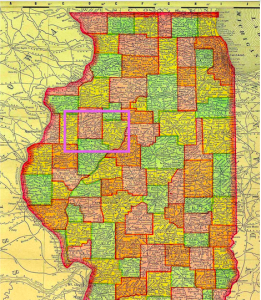
Although the text is not labeled as such, it might have consisted of separate letters to her mother and her brother.
Peoria Jan 17th /42
Dear Mother
You see from the date that we are in Peoria – we have found a home once more.- [sic] How long we shall remain here is uncertain – The Church have urged Mr. A to come & stay with them for a season- The people are opposed to abolition & other reforms – there is a great deal of business done here & a strong tide of worldliness – it is esteemed a hard field of labor – particularly as the church is feeble, & worldly & generally opposed to the doctrime [sic] of Holiness, to the reforms of the day. But for some strange reason, they seemed to feel that Mr. Allan was the man for them, &gave [sic] him an unanimous call to come. We anticipate opposition, & may be compelled to leave, if faithful to God & his truth. We are boarding in a very pleasant family – Mr. Pettingill’s1 – They have but one
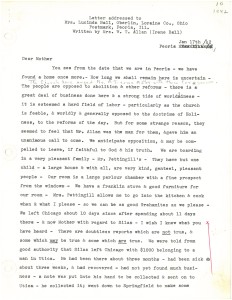
child – a large house & with all, are very kind, genteel, pleasant people – Our room is a large parlour chamber with a fine prospect from the windows – We have a franklin stove2 & good furniture for our room – Mrs. Pettingill allows me to go into the kitchen & cook when & what I please – so we can be as good Grahamites3 as we please – We left Chicago about 10 days since after spending about 11 days there – & now Mother with regard to Silas – I wish I knew what you have heard – There are doubtless reports which are not true, & some which may be true & some which are true. We were told from good authority that Silas left Chicago with $1000 belonging to a man in Utica. He had been there about three months – had been sick about three weeks, & had recovered – had not yet found much business – a note was put into his hand to be collected & sent on to Utica – he collected it; went down to Springfield to make some exchanges with the Bank & never returned – He came to Chicago with young Clark (who told me these particulars) – Clark told me that on their way out Silas became acquainted with & interested in a young widow, a Mrs. Margaret Lee of Medina, Ohio. They agreed to correspond before they separated, & this correspondence resulted soon in an engagement. The people of Chicago waited a fortnight for Silas to return after he went to Springfield, & then began to inquire why he did not return – Clark said that he concluded that Silas took a freak into his head after he got to Springfield to visit Mrs. Lee & he told them he had no idea that S. meant to take the money – But they
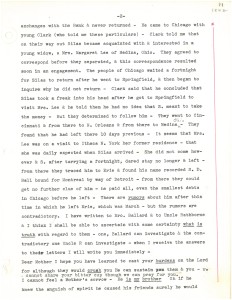
determined to follow him – They went to Cincinnati & from there to N. Orleans & from there to Medina, Ohio – they found that he had left there 10 days previous – It seems that Mrs. Lee was on a visit to Ithaca N. York her former residence – that she was daily expected when Silas arrived – She did not come however & S. after tarrying a fortnight, dared stay no longer and left – from there they traced him to Erie & found his name recorded S. D. Ball bound for Montreal by way of Detroit – from there they could get no further clue of him – he paid all, even the smallest debts in Chicago before he left – There are rumours about him after this time in which he left Erie, which was March – but the rumors [sic] are contradictory. I have written to Bro. Ballard & to Uncle Rathborne & I think I shall be able to ascertain with some certainty what is truth with regard to them – one, Ballard can investigate & the contradictory one Uncle R can investigate – when I receive the answers to their letters I will write you immediately –
Dear Mother I hope you have learned to cast your burdens on the Lord for although they would crush you He can sustain them & you – We cannot share your bitter cup though we can pray for you. I cannot feel a Mother’s sorrow – He is my brother Oh if he knew the anguish of spirit he caused his friends surely he would [not?] do this – but he is his own worst enemy – There are some minute details with regard to him which I will tell you when I see you – perhaps next summer – You proposed to me to come on early in the spring – I think I had not better come so soon. I shall want to visit you longer than Mr. A. will think that he can stay – if you think it worth while perhaps I will come on a month or so before husband goes – Dear Mother I hope you will feel it a duty to rise as much as possible above your troubles that they may not injure your health or shorten your life. I hope you will fix yourself comfortably at O.4 & calculate to live many years yet. I want you to live to see McCullum5 in active life – to see the Slaves made men – to see glorious things accomplished in the church & world – I wrote to Bro. B to meet me in O. next summer & bring Melinda & Lucinda. Where is Duane?6
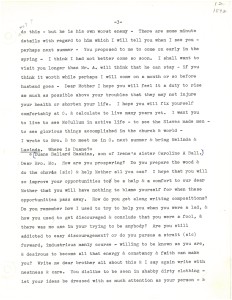
Dear Bro. Mc. How are you prospering? Do you prepare the wood & so the chors [sic] & help Mother all you can? I hope that you will so improve your opportunities to be a help & a comfort to our dear Mother that you will have nothing to blame yourself for when these opportunities pass away. How do you get along writing compositions? Do you remember how I used to try to help you when you were a lad, & how you used to get discouraged & conclude that you were a fool, & there was no use in your trying to be anybody? Are you still addicted to easy discouragement? or do you pursue a strait [sic] forward, industrious manly course – willing to be known as you are, & desirous to become all that energy & constancy & faith can make you? Write me dear brother all about this & I say again write with neatness and care. You dislike to be seen in shabby dirty clothing – let your ideas be dressed with as much attention as your person – & remember that bad spelling & writing exhibit a man’s mind as rags & filth do his person – be careful dear brother & begin now.7 The next line you write let it be where it may, write well and see that your words are all spelled correctly. I suppose you will see a Mr. Todd (who has been spending some months in Illinois) soon. Mr. A. left some money to be sent by him to Mr. Gillet – enough to pay that miserable debt we have been so long owing Bro [illegible] Love to Ann E. Gillett, Mrs. Th[?] & C.
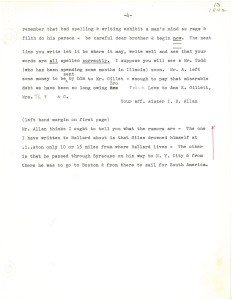
Your aff. sister I. B. Allan
(left hand margin on first page)
Mr. Allan thinks I ought to tell you what the rumors are – The one I have written to Ballard about is that Silas drowned himself at ..i..ston [sic] only 10 or 15 miles from where Ballard lives – The other is that he passed through Syracuse on his way to N. Y. City & from there he was to go to Boston & from there to sail for South America.
Transcribed by Athena Pult and Joanna Wiley
1 Moses Pettengill (1802-1883) was an abolitionist from New Hampshire who moved to Peoria with his wife Lucy (1802-1864) in 1834. He was the president of the city’s first anti-slavery society and was nominated for state senator by the anti-slavery Liberty Party in 1842 and 1846. He also opened his house as a sanctuary on the Underground Railroad. Lucy established the Female Anti-Slavery Society of Peoria (Gary Panetta, “Pettengills Worked in Peoria to End Slavery,” Journal Star, 18 October 2008.)
2Type of stove invented by Benjamin Franklin.
3 This is a reference to those who followed the diet invented by reformer Sylvester Graham (1794-1851), who advocated a diet focused on fresh fruit and vegetables. This passage seems to be referencing Graham’s emphasis on the importance of baking bread at home (“Sylvester Graham.” Encyclopedia Britannica, last modified 2013, web address.)
4 Either Ohio or Oberlin.
5 Archibald’s middle name.
6 Irene’s nephew, son of Caroline, her only sister.
7 This word is underlined three times.